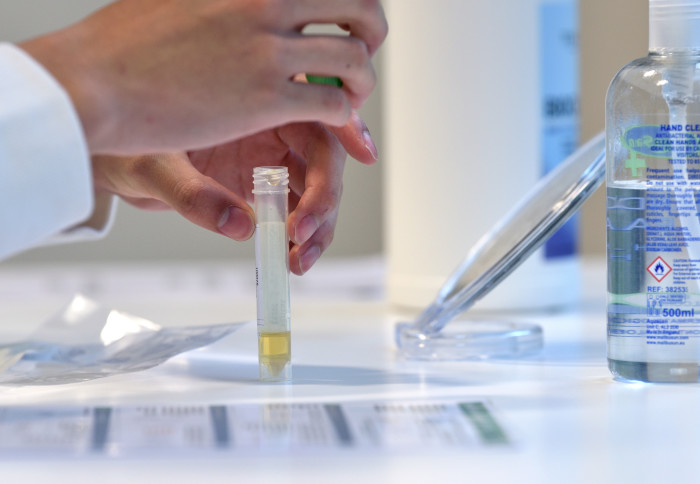

The number of people infected with the coronavirus is increasing rapidly in England, doubling every 11 days.
New data from the REACT study, based on almost 110,000 home swab tests taken between 20th May and 7th June, estimates that 0.15% of people have the virus, or roughly 1 in 670. This is a 50% increase compared to the study’s previous findings, when 0.1% or 1 in 1,000 had the virus as of 3rd May.
"These data coincide with the Delta variant becoming dominant and show the importance of continuing to monitor infection rates and variants." Prof Paul Elliott School of Public Health
Led by Imperial College London, the scientists estimate that in the most recent testing round, the reproduction number (R) is 1.44. This means 10 infected people would pass the virus on to 14 others on average, resulting in fast growth of the epidemic.
Most infections are happening in children and young adults, but they are rising in older people too, increasing at a similar rate in the over 50s and the under 50s.
The study found that the link between infections, hospitalisations and deaths had been weakening since February, suggesting infections were leading to fewer hospital admissions and deaths due to the vaccination programme. But since late April, the trend has been reversing for hospitalisations.
Professor Paul Elliott, director of the REACT programme from Imperial’s School of Public Health, said: “We found strong evidence for exponential growth in infection from late May to early June in the REACT-1 study, with a doubling time of 11 days on average for England. These data coincide with the Delta variant becoming dominant and show the importance of continuing to monitor infection rates and variants of concern in the community.”
These findings from the ongoing REal-time Assessment of Community Transmission (REACT-1) programme, led by Imperial and carried out in partnership with Ipsos MORI, are available here in a pre-print report and have been published in the journal Science.
Coronavirus trends
For this latest round of the ongoing REACT study, 108,911 people swabbed themselves at home and their samples were analysed by PCR testing. 135 of these were positive, of which the vast majority (around 90%) were the Delta variant at the end of the study round. This is consistent with Public Health England (PHE) data reporting that the variant accounts for 90% of infections.
"If this growth continues it will drive up infections in older, more vulnerable people, and would lead to more hospitalisations and deaths." Prof Steven Riley School of Public Health
In the study’s previous testing round patterns of infection were fairly similar across the country, but the latest data showed substantial regional variation. The highest prevalence was found in the North West at 0.26%, up from 0.11% in the previous round, while the South West had the lowest at 0.05%, slightly down from 0.07%.
By age, 5-12-year-olds and 18-24-year-olds had the highest prevalence at 0.35% and 0.36%. Although prevalence in people under the age of 50 was 2.5 times that of those aged 50 and above (0.20% vs 0.08%), infections appear to be growing at a similar rate in both groups.
The study has also been tracking the relationship between infections, hospital admissions and deaths across different age groups. Since February, the link between infections, hospitalisations and deaths has weakened in people aged 65 and above, while there has been a recent reversal of these trends for those under 65, which likely reflects lower vaccination rates in this group.
Professor Steven Riley, Professor of Infectious Disease Dynamics at Imperial, said: “Even though we are seeing the highest infection prevalence in younger people who are less susceptible to COVID-19, if this growth continues it will drive up infections in older, more vulnerable people, as the vaccines are not 100% effective and not everyone has been fully vaccinated. This would lead to more hospitalisations and deaths, and risks straining the NHS, which is why it’s vital that people take up their vaccine offer and continue to stick to the rules.”
Monitoring the COVID-19 epidemic
The REACT-1 study is tracking current coronavirus infections in the community by testing more than 100,000 randomly selected people each month over roughly a two-week period. The study recruits new people each month to help ensure the sample represents the wider population and offers a high-resolution snapshot of the situation across a particular time period.
This is different from the ONS COVID-19 Infection Survey which runs continuously and samples the same people over time to understand household transmission. Because the studies use different methods, this means that sometimes they report different figures.
"We all must hold our nerve that little bit longer as our vaccine rollout continues." Matt Hancock Health and Social Care Secretary
Health and Social Care Secretary Matt Hancock said: “These findings highlight the stark context in which we took the difficult decision to delay Step 4 of the roadmap out of lockdown.
“Cases are now rising, but thanks to our incredible vaccination programme and enhanced response package including surge testing, we have the tools to curb the spread of this virus.
“We all must hold our nerve that little bit longer as our vaccine rollout continues and I urge everyone to keep observing hands, face, space and fresh air, and make sure you receive both doses of the vaccine for the best possible protection.”
Kelly Beaver, Managing Director, Public Affairs at Ipsos MORI, said: “The rise in cases picked up by the REACT-1 study is concerning and is being fed into government decision making in real-time.
"While the rise is small, the increase of the R number to over one highlights that number’s potential to increase rapidly, an important reminder to get vaccinated when you can. I’d like to thank the almost 2 million members of the public who’ve taken part in the REACT-1 study since it began a year ago for helping provide this crucial piece of evidence to government.”
Article text (excluding photos or graphics) © Imperial College London.
Photos and graphics subject to third party copyright used with permission or © Imperial College London.
Reporter

Justine Alford
Institute of Global Health Innovation

Contact details
Tel: +44 (0)20 7594 1484
Email: j.alford@imperial.ac.uk
Show all stories by this author



